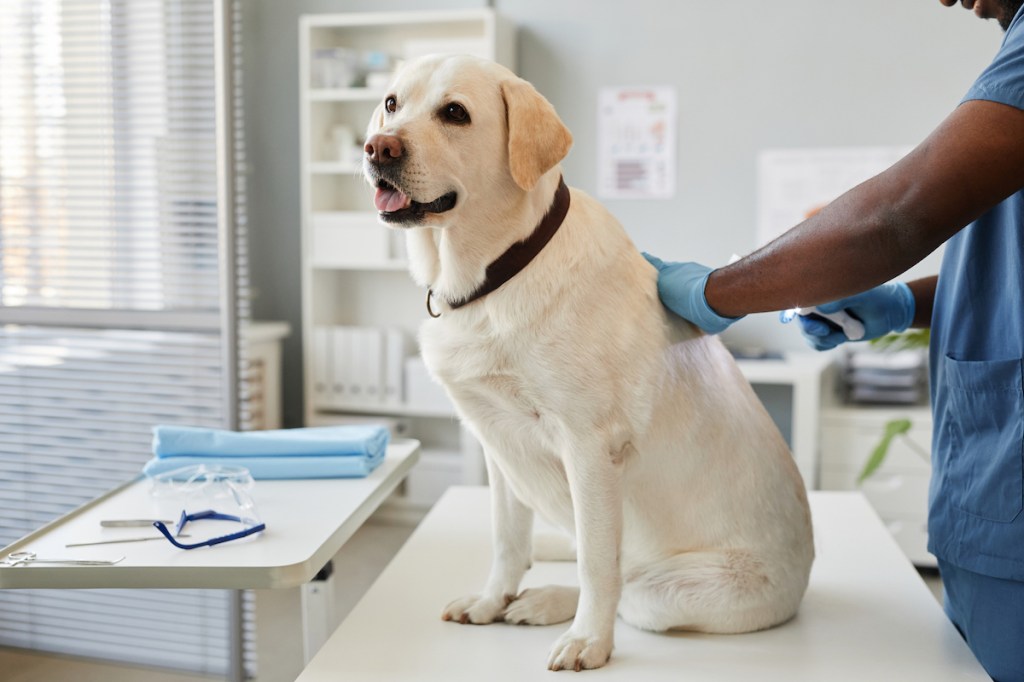Intervertebral disc disease (IVDD) in dogs is a disorder of the spine. This is a neurological condition caused by herniated discs. In humans, this would be similar to a “slipped disc” or “bulging disc.”
Generally, IVDD can cause a range of symptoms including back pain and movement issues. Also, it can become progressively worse.
Sadly, certain breeds seem to suffer from the problem more than usual. For example, the Beagle, Dachshund, and Pekinese breeds seem predisposed to it, along with other pups prone to dwarfism — known as chondrodystrophic breeds.
If you see signs that your dog might be suffering from this condition, then you must consult your veterinarian for a proper diagnosis and course of treatment. Here’s what you should know about the symptoms, causes, and treatments of intervertebral disc disease in dogs.
Symptoms of intervertebral disc disease (IVDD) in dogs
Intervertebral disc disease in dogs can result in a range of symptoms. The symptoms can become progressively worse.
Specifically, some of the most common symptoms include:
- Neck pain
- Back pain
- Hind limb problems
- Pain
- Movement issues (including avoiding stairs)
- Tense stomach
- not being able to pee
- Tense neck
- Trembling
- Paralysis
Causes of intervertebral disc disease (IVDD) in dogs

The cause of the condition is damage to the spinal cord. Specifically, discs between the bones of a dog’s spine can become compressed and rupture.
Technically, this process can be acute — which is known as Hansen Type I — or can happen over time due to everyday activity — which is called Hansen Type II. In particular, the following breeds seem to suffer from the Hansen Type 1 version of intervertebral disc disease:
- Dachshund
- Corgi
- Cocker Spaniel
- Beagle
- Poodle
- Pekinese
- Shih Tzu
- Lhasa Apso
- Basset Hound
Alternatively, there are some larger breeds predisposed to Hansen Type II of the disease. This is a result of disc degeneration occurring as these dogs age. Specifically, the following breeds seem to often suffer from IVDD:
Treatments for intervertebral disc disease (IVDD) in dogs
Firstly, if you think that your dog might be developing the condition, your veterinarian will want to carry out a full physical examination of your dog. Secondly, your vet will ask about your dog’s complete medical history. This will include any breed-specific problems.
Next, a number of tests will be used to confirm the condition. For example, baseline blood and urine tests, as well as neurological exams can be used. X-rays are typically taken to assess the extent of narrowing between vertebrae. However, MRIs are now viewed as the gold standard because they allow veterinarians to get a complete picture of the dog’s spine. Also, in some cases, a spinal tap will be needed.
Generally, treatment will depend on the severity of the disease. For example, minor cases can benefit from crate rest — to minimize motion — and pain medication. As always, if your vet prescribes your dog any medicine, stick to the correct dose and frequency instructions. Also, these dogs should not be allowed to jump to or from high surfaces. They should avoid dangerous games like frisbee and should be walked using a supportive harness.
However, more severe cases of intervertebral disc disease can require surgery to help decompress any affected discs. In particular, this is done to remove bony vertebra affecting the dog’s spinal cord. As such, this is often carried out by a neurosurgeon. Surgery typically costs between $2,000 and $5,000, not including pre- or post-op treatment.
While recovering from surgery, your dog will need to be placed on a reduced exercise regime. Also, physical therapy can often help canines recovering from intervertebral disc disease. Some dogs benefit from the use of a specialized dog wheelchair if they are unable to achieve full mobility even after surgery.




